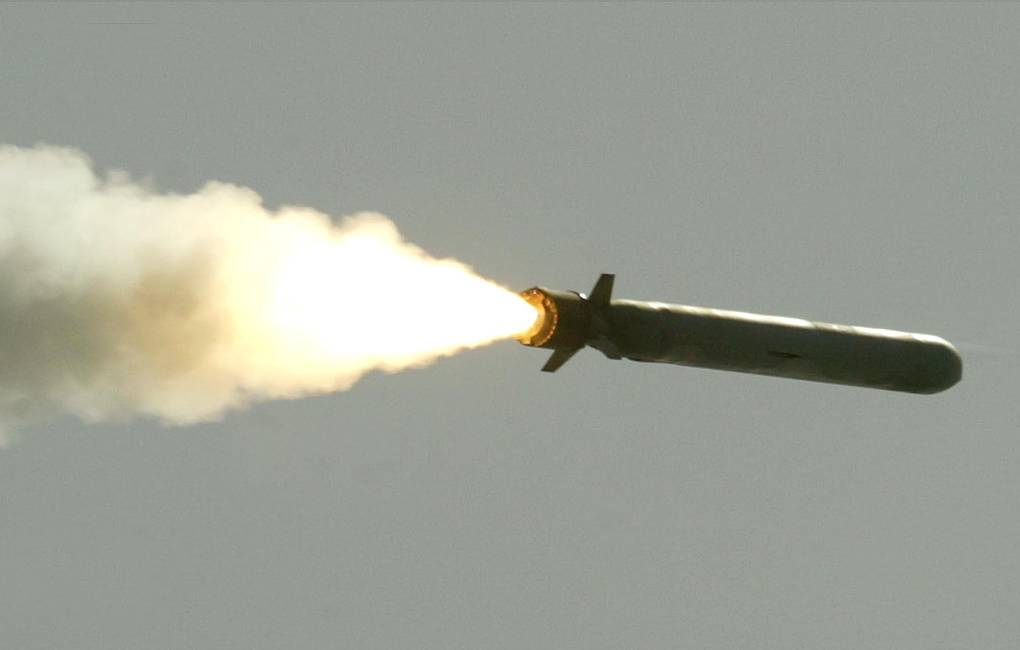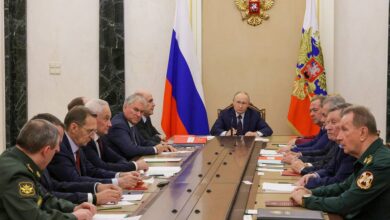Press review: EU backs Tomahawk supply to Ukraine as NATO conducts tactical nuke drills
Top stories from the Russian press on Tuesday, October 14th
MOSCOW, October 14. /TASS/. A Gaza peace summit took place in Egypt, the EU supports supplying Tomahawks to Ukraine, and NATO is conducting large-scale military drills. These stories topped Tuesday's headlines across Russia.
Vedomosti: Peace summit on Gaza Strip kicks off in Egypt
A "peace summit" took place in Egypt’s Sharm El-Sheikh on October 13 following the official conclusion of a ceasefire agreement in the Gaza Strip between Israel and the Palestinian movement Hamas, which entered into force on October 10. Alongside US President Donald Trump, the architect of the deal, and mediators represented by the leaders of Egypt, Qatar, and Turkey, the meeting was attended by delegates from most Arab nations as well as Germany, the UK, France, Italy, and Spain. However, Israeli Prime Minister Benjamin Netanyahu declined to take part in the event because of the upcoming Simchat Torah Jewish holiday, his office stated. Post-Soviet countries were represented in Egypt only by Azerbaijani President Ilham Aliyev and Armenian Prime Minister Nikol Pashinyan.
A few hours before the gathering, Hamas transferred to Israel all 20 living hostages through Red Cross intermediaries. After that, Israel pledged to release around 2,000 Palestinians from its prisons.
Leaders of Egypt, Qatar, US, Turkey sign Gaza ceasefire deal — broadcast
The summit’s objective is to solidify Trump’s initiative and set out the main principles to prevent another war in the Middle East, Eastern studies expert Kirill Semyonov noted. The event aims to become a turning point, after which the renewal of hostilities would be regarded as a breach of international law, the expert said. "Thus, those who violate the accord risk facing sanctions. Undoubtedly, the participants will also discuss carrying out further stages of Trump’s plan and developing a roadmap for Gaza’s reconstruction and post-conflict future," he explained.
According to Program Manager at the Russian International Affairs Council (RIAC) Ivan Bocharov, during the summit, the Trump administration will seek to broaden the circle of those responsible for enforcing the agreement. Still, while the meeting’s participants might ease tensions in the Middle East, resolving all disputes between the opposing parties is essential for a lasting peace, the expert emphasized.
He added that Hamas presents itself as a leader in the Palestinian liberation movement, therefore, it hopes to be included in future administrative structures. Because of this, the transition to the next phase of the agreement is not assured — negotiating its provisions could become bogged down in endless disputes over the sequence of implementing the deal and the conditions for disarming Palestinian militants and forming new governing institutions, the expert concluded.
Nezavisimaya Gazeta: Top European diplomat visits Kiev, pledging unprecedented support
EU High Representative for Foreign Affairs and Security Policy Kaja Kallas arrived in Kiev on Monday. She held a joint press conference with Ukrainian Foreign Minister Andrey Sibiga, who stated that there should be no restrictions on the supply of weapons to Kiev. Kallas, in turn, endorsed the potential sale of US-made Tomahawk cruise missiles to Ukraine.
Tomahawk launches to require US involvement, could end badly — Kremlin spokesman
Leading expert at the Russian Institute for Strategic Studies Oleg Nemensky told Nezavisimaya Gazeta that Kallas sees her mission as maximally equipping the Kiev authorities with the most powerful weapons, while EU states are advancing the militarization planned for 2030.
According to the expert, the problem lies in the fact that Europe itself is undergoing a deep crisis. Its external drivers of economic growth and high living standards have been depleted. For example, in recent years, European countries have lost access to affordable energy from Russia and to the Russian market, as well as the benefits of active cooperation with China. All this has resulted in the deindustrialization of European nations, causing serious difficulties even in Germany, which traditionally acted as Europe’s economic engine, and in the UK.
"Under such circumstances, Europe is experiencing a significant decline in living standards for its citizens, with no real opportunities to improve the situation. That is why they found a way out in fueling an armed confrontation with Russia," Nemensky explained.
In his view, Brussels considers a military and political alliance with the US as another key factor for success in the conflict with Russia. Yet it remains uncertain whether US President Donald Trump truly intends to deliver the Tomahawks to Ukraine or is merely using them to pressure Russia into certain concessions, as some analysts insist.
Moscow regards the ongoing large-scale conflict on Ukrainian territory since February 2022 as an existential struggle and does not consider the tactics employed by Washington as appropriate, the expert stated.
Media: NATO to rehearse use of tactical nuclear weapons
Large-scale NATO Steadfast Noon maneuvers aimed at testing nuclear deterrence, involving 71 aircraft and 2,000 troops, kicked off on October 13. According to the alliance’s official sources, the drills are held without actual warheads. Despite NATO’s claims about the planned nature of the exercise, military experts are convinced that scenarios directed against Russia’s interests, including a possible blockade of the Baltic region, are being practiced under the cover of these maneuvers.
"Given the overall buildup of NATO’s forces in Eastern Europe and the Baltic region, as well as the inclusion of Finland and Sweden, which significantly shifted the balance of power, it can be assumed that the real objectives of the exercises are diverse. They may involve rehearsing plans for 'isolation' or 'dominance' in the Baltic area, and exploring ways to restrict maritime routes, including, possibly, through key zones such as the Danish Straits," military expert Vasily Dandykin told Izvestia.
Earlier, Russian Federation Council Vice Speaker Konstantin Kosachev stressed that the Steadfast Noon maneuvers act as a provocative move.
"This is an extremely risky development, which, naturally, cannot but trigger a response and countermeasures. And, I believe, not only from Russia. It touches upon global security matters, namely, nuclear weapons," Kosachev said in an interview with Izvestia.
Nezavisimaya Gazeta noted that Finland, Russia’s neighbor and a new NATO member, is taking part in the Steadfast Noon drills for the second consecutive year. According to Finnish Defense Minister Antti Hakkanen, his country dispatched staff officers and F/A-18 Hornet fighter jets to the exercise. It remains unclear whether this marks a consistent trend or a reaction to unidentified drones in European airspace. If this is indeed a pattern, one should recall that Finnish authorities have already voiced interest in hosting nuclear-capable US aircraft on their soil. The Finnish military no longer treats a Russian offensive as a far-fetched scenario.
Izvestia: Slovakia ready to call EU Council meeting over Russian gas
The European Union is seeking to accelerate the process of phasing out Russian oil and gas by 2028. Slovakia is preparing to request an extraordinary session of the EU Council (EC) in response, Deputy Speaker of the country’s parliament Tibor Gaspar told Izvestia. Bratislava also plans to exercise its veto power on new sanctions against Russia if the economic impact proves too high. Experts believe that Slovakia and Hungary have limited chances of halting the decision without gaining support from other nations.
Igor Yushkov, an expert at the Financial University under the Government of the Russian Federation and the National Energy Security Fund, told Izvestia that the EU’s plan to abandon Russian energy by 2028 has not yet been finalized. He underlined that Bratislava and Budapest remain interested in maintaining Russian deliveries and will continue to oppose the EC’s initiative.
"Any alternative, of course, would be less favorable for Hungary and Slovakia. They are under immense pressure," the expert remarked.
Ways to bypass the blocking veto have already become a separate tactic in EU decision-making, Darya Moiseyeva, chief analyst at the autonomous non-profit organization Kolaboratoriya, said in an interview with Izvestia. According to media reports, the decision so far has been approved by the EU Committee of Permanent Representatives (COREPER), which includes the heads of permanent delegations (ambassadors) in Brussels.
"After that, the decision previously endorsed in COREPER is forwarded to the ministers of EU member states (members of the EU Council) for further review. This is where the main and most challenging work begins, since the committee meeting is largely a formal and technical stage in examining the draft legislation," the expert explained.
Because such a procedure does not require unanimous approval, Slovakia and Hungary will be unable to block it on their own. As Moiseyeva noted, Bratislava and Budapest can only attempt to build a coalition. In this respect, the scope for finding partners is narrow, but it exists. Thus, according to Politico, the governments of France and Belgium had earlier refused to back a ban on LNG imports from Russia under current agreements by the end of 2027. Austria also expressed concerns about this.
Izvestia: Why Nobel Prize in Economics was awarded
The 2025 Nobel Prize in Economics was granted in response to worldwide challenges, the slowing pace of global GDP growth, inequality, and technological transformations, experts interviewed by Izvestia believe. The award was given to Joel Mokyr, Philippe Aghion, and Peter Howitt for explaining economic growth through innovations. Back in 1992, scholars developed a model of "creative destruction" enterprises selling old products suffer losses when updated goods enter the market.
The committee chose this topic as a reaction to global challenges, the deceleration of global GDP growth (according to IMF estimates, it will increase by 3% in 2025 compared with 3.2% in 2024), inequality, and structural transformations caused by digitalization and artificial intelligence (AI), Finam Strategy Director and HSE lecturer Yaroslav Kabakov pointed out.
Nobel Prize in Economics awarded for work on how new ideas power economies
The relevance of the research is linked to the technological shift driven by the widespread adoption of AI, the automation of production, and the digitalization of the economy. This raises the question for analysts of how to create an institutional environment favorable to innovative development and fair distribution, says Elmira Asiayeva from the Plekhanov Russian University of Economics.
"The global economy is going through a period of profound structural transformation, when the traditional factors of production, labor and capital, are increasingly giving way to knowledge, technology, and human capital. Grasping the mechanics of this transition is becoming critically important for the formulation of effective economic policy," the expert believes.

